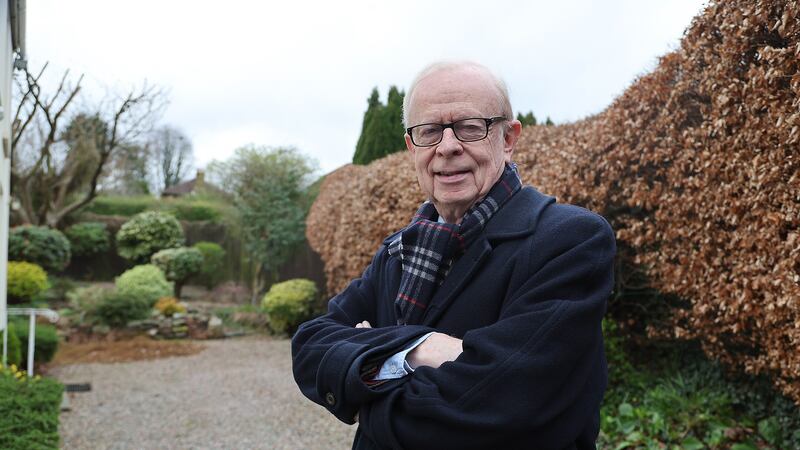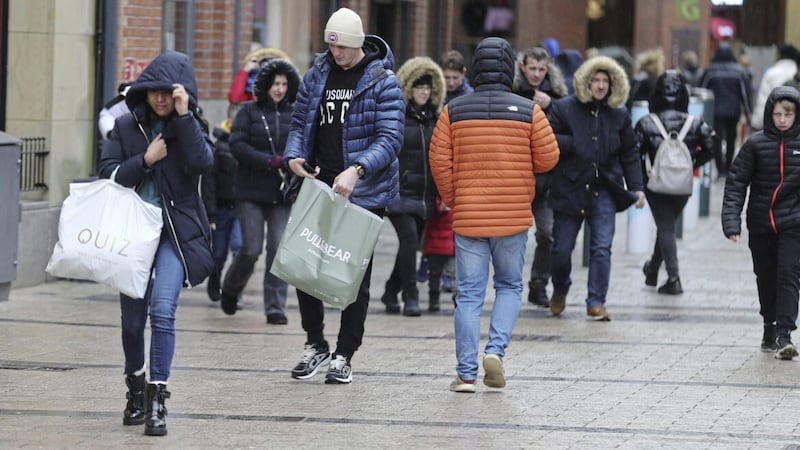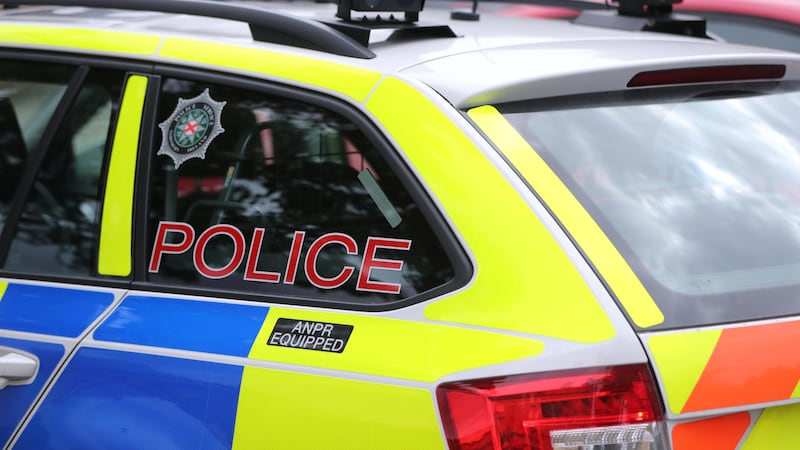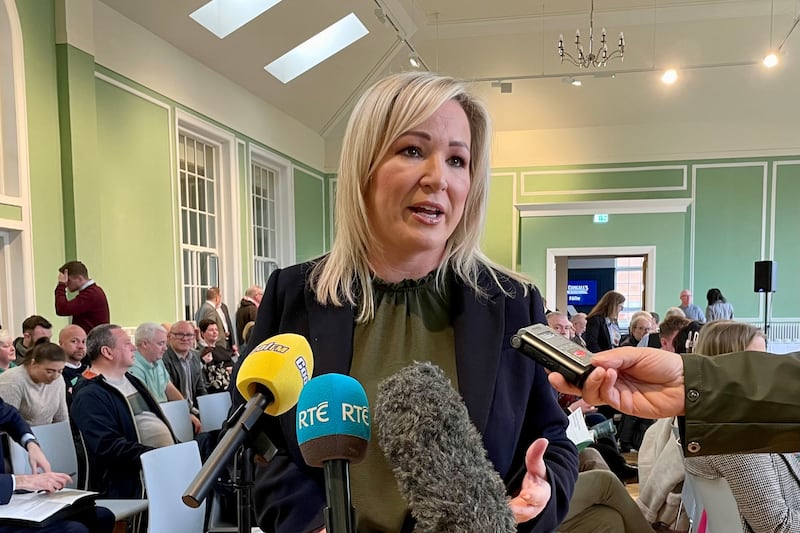"ON balance," Lord Reg Empey says of the Good Friday Agreement, "I think it has been a good thing."
A key member of the Ulster Unionists' negotiating team, the former Belfast lord mayor went on to serve as acting first minister, inaugural economy minister and to succeed David Trimble as party leader after the disastrous Westminster election of 2005.
Twenty-five years on, the 75-year-old peer still makes regular contributions to international conferences on peace-building, albeit remotely. However, in common with most of his party colleagues, he speaks with deep regret about changes to the agreement some eight years later at St Andrews.
"St Andrews was, in my opinion, a catastrophe for the (Good Friday) agreement, because they changed the mechanism for electing the first and deputy first minister," he says of the deal that paved the way for the DUP and Sinn Féin to share power.
The former East Belfast MLA concedes that his complaint "sounds like a terribly anorak sort of issue", adding that "a lot of people don't understand the minutiae – in fact, I don't think ministers understood them".
The original mechanism for electing Stormont's leaders was designed to ensure "people felt they had a hand on the steering wheel".
"So it was the very opposite of majoritarianism," says Lord Empey.
"It was an awkward consensus based partnership model, not the most efficient in the world by any means, but it was worked out over years of discussion, and it boiled down to this – that the first and deputy first minister were to be jointly elected on a cross-community vote by the whole assembly to give them the democratic mandate."
Read More
- Tom Kelly: Celebrate GFA - now is not time for its epitaph (premium)
- Tony Blair says unionism needs a leader of David Trimble's courageousness
- Bríd Rodgers acknowledges flaws of past 25 years but has no regrets over peace
- Gerry Adams says risks taken for peace were 'occupational hazard'
He says it also provided "political and public recognition of the principle of partnership".
"One side could veto the other but it meant the message was no one community could dominate the other, that there was going to be a consensus and it would be done jointly - it would be awkward, it would be difficult, but it would achieve consent," he says.
Yet Ian Paisley's reluctance to be cast as an equal in office to Martin McGuinness, coupled with the Sinn Féin figurehead's fear that his bid to be deputy first minister would be vetoed by unionists, helped prompt the rule change eight years later.
"So what happened was that the government negotiated Strand One again but with the parties who didn't negotiate it in the first place," says Lord Empey.
Gerry Adams speaks to The Irish News to mark 25 years since the Good Friday Agreement
"Bearing in mind, we had put the agreement to the people before we end entered the assembly, so it had a democratic mandate, never achieved before or since on this island. – and they arbitrarily changed it behind our backs."
Under the revised rules, the first minister would be drawn from the biggest party in the largest designation and the deputy first minister drawn from the biggest party in the second largest designation.
The move was "very short sighted", says Lord Empey and "Tony Blair's first big mistake".
"It was very dangerous because the irony of all of this is if we fast forward to today, Sinn Féin is the largest party, therefore Michelle O'Neill is effectively first minister designate and the DUP is second largest party, and Jeffrey Donaldson, as was after the election, would be deputy first minister," he says.
"Had he left it alone, the way we negotiated, Jeffrey Donaldson would have been first minister – now if that's not being hoisted by your own petard, I don't know what it is."
Tony Blair speaks to The Irish News to mark 25 years since the Good Friday Agreement
The former acting first minister, who insists "there's no difference legally between the two posts", doesn't blame the DUP or Sinn Féin but the two governments.
"Because they pride themselves on being the co-guarantors of the agreement, particularly Dublin," he says.
"So what did they do? They sat there and they allowed that to happen – and that, in my opinion, is the key mistake that was made."
Lord Empey argues that unlike the Good Friday Agreement, the changes at St Andrews were unilateral.
"We had a mandate from the electorate in the referendum, who authorised us to proceed to those institutions before we actually started them off, and that was swept aside – I think that was a big, big mistake" he says.
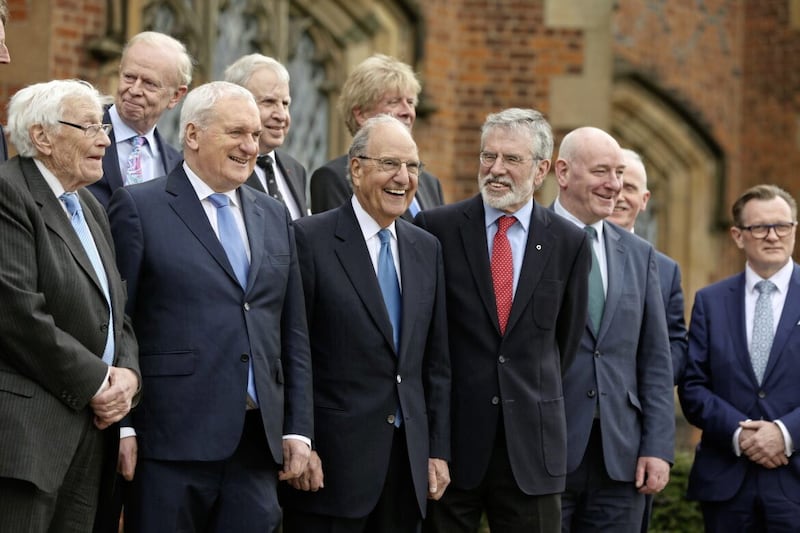
Lord Empey is understandably protective of the agreement that he along with many others worked for years to bring to a conclusion. He regards the appointment of Senator George Mitchell as talks chair in June 1996 as pivotal, although it was an unpopular choice with more hardened unionists.
"He knew that to get a deal there's no point in having your opponent flat on the canvas, because that person can't deliver anything, so he understood deal-making," he says.
"And he knew people had to be able to stand up and carry their supporters."
Sinn Féin joining the talks in the aftermath of the IRA's 1997 ceasefire was also a "big deal"
On relations with republicans, the then Policing Authority member was pragmatic.
"I knew only too well what republican terrorism was doing to the security forces, so I was under absolutely no illusion, but you have to remember that the UK government's attitude had changed towards Sinn Féin, and it was obvious that they retained a significant amount of electoral support," he says.
Brid Rodgers speaks to The Irish News to mark 25 years since the Good Friday Agreement
Lord Empey is also dismissive of suggestions that Sinn Féin were adept at deal-making.
"People have the idea that somehow Sinn Féin were the tough negotiators for nationalists– my experience is that the SDLP ran rings around them in terms of negotiations," he says.
"We certainly would have been more wary of a lot of things the SDLP did on behalf of their nationalist constituents than Sinn Féin, because they were more subtle."
He describes the Sinn Féin approach as "dogmatic, centrally controlled" and highlights that the party "made no contribution to Strand One at all, except there was one or two sheets of paper produced two days before the end".
"So their acceptance of the Good Friday Agreement, by and large, has come a long time after the agreement was done," he says.
The former Ulster Unionist leader acknowledges that it was a long process that ultimately led to the Good Friday Agreement but he also recognises the importance of the final day. However, while he believes there was a certain inevitability to the deal – ""We all knew that it was going to happen" – the Ulster Unionist peer recalls how the process almost floundered in the days over the proposed reach of the north-south bodies – the source of John Taylor's "wouldn't touch it with a 40ft barge pole" remark.
Despite the late setbacks, on Good Friday morning things began falling into place.
"We were taking our time and other parties were getting very nervous," says Lord Empey, recalling a "confrontation" between UUP delegates and Alliance's John Alderdice.
"Anyway, that faded away and we took her time – obviously, Jeffrey Donaldson left at that time," he says.
"But David stood up, either on a chair on a table in this room where we were sitting, there was maybe 40 people in the room, and said: 'Look, I received this from George, it is my intention to go up and accept it, and those of you who are willing to join me are very welcome.'
"And that was it, so he went up the stairs and told George that we were doing this."
